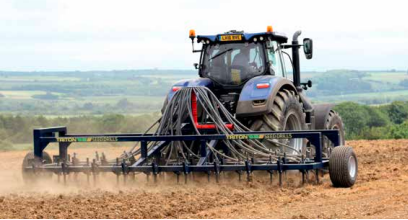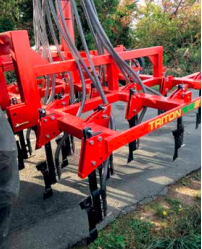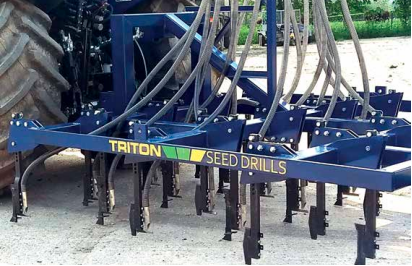
The Triton seed drill from Cambridge is designed to sow all seeds, into all soils, in all weathers. The Triton sidepress seed drill has 12 patent applied features which enable seed to be set securely with air and rooting zones into ideal conventional seed beds or when direct drilling into wet clay in winter the beat black-grass. With milling wheat at £200/t and rape at £330/t the Triton allows farmers to go back to a highly profitable wheat and rape rotation.
The Triton seed drill often pays for itself in just one field of wheat drilled in November since the alternative of a poor field of spring beans drilled with a conventional drill in May 2018 would have made a loss. Triton drills have undergone extensive testing from Kelso stoney land to London clay and so long as the stubble is cut short with straw chopped to 4inchs the Triton will drill any land on any day of the winter. A Triton drilled a field of Gravity wheat into Essex clay on December 21st and it yielded 4.12t/acre in the drought of 2018.

Triton farms cover 5000 acres from Kelso to Northants including farms in Cambridgeshire and Norfolk over different soil types with different requirements. Triton farms had been operating most of the different seed drills on the market but without much success. No seed drill was capable of direct drilling wet clay from November onwards and so poor performance break crops were used which were destroying farm profits and black-grass was building up rapidly in first wheats to boot.
Using a Triton seed drill, Triton farms gave themselves a 5 year programme to get back to a pure wheat and rape rotation but managed to get there in one autumn of 2017.. such was the reduction of blackgrass in our earlier planted wheat that we scrapped our plans for peas, beans and spring barley and went wall to wall wheat finished in late December, we applied no herbicide and the Gravity yielded 4.12t/acre. The Triton Delta sowing blade sweeps black grass seed down below the germination layer as it drills and with no inversion the fields are very clean. The savings on chemical are very considerable but the potential increase in farm output is even greater.

The Triton uses a soil heave system to shut the drilling slot so that no rear roller press or harrow is required. The wetter the soil the more easily the slot it shut. The Triton Rock-Hopper version allows day long drilling into marginal or stoney ground without stoppages. AminoA Flo is applied to all our crops and 2018 saw farm records broken across all our farms even in the drought. AminoA will boost the late sown crops so that the crop performs like an earlier drilled crop but without the black-grass. There are some farmers who say you should drill in November but the Triton will drill on every wet day in October too so it puts the seed programme on course whether its drilling sprong barley in late Feb, or spring wheat in mid-November, or first wheats in autumn.
The output from a Triton drill is considerable .. the Triton can be pulled at 20kmh and contintues to perform just the same. A deep rooting channel of 6 inchs is cut below every seedling for maximum yield and compaction removal by vertical tillage. No rolls are required afterwards which is arguable better than CTF because Triton only goes acroos the field once and lifts the soil as it goes. Triton is stand alone seeding system starting from £13,950 excluding the front seed hopper. Most Triton seed drills have been sold to big farming companies who want to use their existing tackle early in the autumn in tandem with the Triton but then in the late autumn the Triton continues on its own drilling wheat to reduce the spring cropping area of poor performance drought prone crops.

The ultimate all weather capability of the Triton is invaluable when adjusting the rotation because if black-grass does proliferate in a late drilled crop then it can be sprayed off and re-direct-drilled straight away or left till early spring. The Triton gives spring crops the best chance of yielding well because spring cereals can be drilled in late february into wet clay. Slugs and aphids are largely inactive in the deep winter so the crops grow on unchallenged, applying AminoA gives the plants growth and should be timed for when the seed energy has been used up at two or three leaves as there is no sun energy in December.
Changing a farming system is a hard decision for farmers .. generally a farmer already has equipment that suits the soil, and a rotation running over many years. ‘Its like playing a game of chess with blackgrass as the opponent.. the blackgrass keeps putting the farm in check but the farmer is hopeful of winning in the end.. so the farming system and equipment is kept on until the chess game is finished, even if a better strategy is available.’ Over the last 20 years seed drills have become heavy, high maintenance , and more limited in late season use. The Triton reverses this. ‘There is a lot at stake for Triton farms and we will only use the most capable seed drill on the market. All our previous drills from 6 established manufacturers are for sale.
We would not be using a seed drill unless it was creating a big advantage for us.’ All the Triton parts are made in Retford and Leeds , manufacture would be cheaper in Eastern Europe but Simon Chaplin insists that every Triton is fully British, even the blank steel has to be produced in the UK. Triton runs all New Holland tractors and combines. All Triton farm vehicles and private cars are British made. ‘With or without Brexit , Britain will flourish if we all invest in what our fellow UK workers are producing.